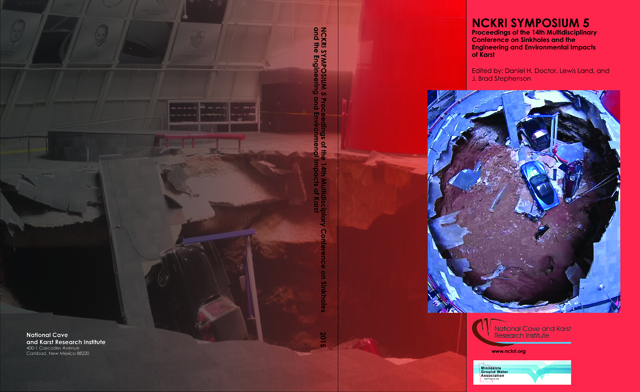Abstract
Fluid dynamics in karst systems is complex due to the heterogeneity of hydraulic networks that combine the Porous Fractured Matrix (PFM) and the interconnected drains (CS). These complex dynamic systems often need to be treated as “black boxes” in which only input and output properties are known. In this work, we propose to assess the first-order error induced by considering the temperature as a conservative tracer for flows mixing in karst (fluvio-karst). The fluvio-karstic system is treated as an open thermodynamic system (OTS), which exchanges water and heat with its surrounding. We propose to use a cylindrical PFM drained by a water saturated cylindrical CS, connected on one side to a sinkhole zone and, on the other side, to a resurgence flowing at the base level of the karstic system. This framework allows us to develop the equations of energy and mass conservation for the different parts of the OTS. Two numerical models have been written to solve these equations: 1) the so-called AW (for Adiabatic Wall) configuration that assumes a conservative tracer behavior for temperature with no conductive heat transfer, neither in the liquid, nor in the PFM or even through the wall separating the CS from the PFM; and, 2), the CW (for Conductive Wall) configuration that takes into account the heat and mass transfers in water and from water to aquifer rocks both in the CS and in the PFM. Looking at the large variability of karstic system morphologic properties, dimensionless forms of the equations have been written for both AW and CW configurations. This approach allows us to gather the physical, hydrological and morphological properties of karstic systems into four dimensionless numbers: the Peclet, Reynolds, Prandtl and dimensionless diffusivity numbers. This formalism has been used to conduct a parametric exploration across several orders of magnitude based on the Peclet and the Reynolds numbers. The final errors, between the AW and CW configurations, remain less than 1% across the entire parametric range. The combination of error curves bounds a closed volume in error space that gives a first upper bound of the error made by considering the temperature as a conservative tracer. Applying the method to an illustrative example of karst allows us to reach a first order error within a few degrees °C.
DOI
http://dx.doi.org/10.5038/9780991000951.1037
Evaluation of First Order Error Induced by Conservative-Tracer Temperature Approximation for Mixing in Karstic Flow
Fluid dynamics in karst systems is complex due to the heterogeneity of hydraulic networks that combine the Porous Fractured Matrix (PFM) and the interconnected drains (CS). These complex dynamic systems often need to be treated as “black boxes” in which only input and output properties are known. In this work, we propose to assess the first-order error induced by considering the temperature as a conservative tracer for flows mixing in karst (fluvio-karst). The fluvio-karstic system is treated as an open thermodynamic system (OTS), which exchanges water and heat with its surrounding. We propose to use a cylindrical PFM drained by a water saturated cylindrical CS, connected on one side to a sinkhole zone and, on the other side, to a resurgence flowing at the base level of the karstic system. This framework allows us to develop the equations of energy and mass conservation for the different parts of the OTS. Two numerical models have been written to solve these equations: 1) the so-called AW (for Adiabatic Wall) configuration that assumes a conservative tracer behavior for temperature with no conductive heat transfer, neither in the liquid, nor in the PFM or even through the wall separating the CS from the PFM; and, 2), the CW (for Conductive Wall) configuration that takes into account the heat and mass transfers in water and from water to aquifer rocks both in the CS and in the PFM. Looking at the large variability of karstic system morphologic properties, dimensionless forms of the equations have been written for both AW and CW configurations. This approach allows us to gather the physical, hydrological and morphological properties of karstic systems into four dimensionless numbers: the Peclet, Reynolds, Prandtl and dimensionless diffusivity numbers. This formalism has been used to conduct a parametric exploration across several orders of magnitude based on the Peclet and the Reynolds numbers. The final errors, between the AW and CW configurations, remain less than 1% across the entire parametric range. The combination of error curves bounds a closed volume in error space that gives a first upper bound of the error made by considering the temperature as a conservative tracer. Applying the method to an illustrative example of karst allows us to reach a first order error within a few degrees °C.

